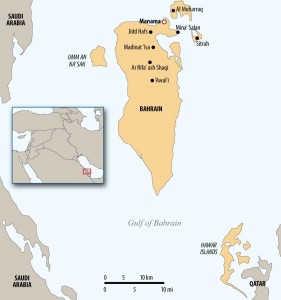Bahrain: State Of Fear Prevails With Arbitrary Detentions, Pre-Dawn Raids
Arbitrary detention appears rampant under Bahrain’s state of emergency, with numerous cases in which authorities have abused people they detained or stopped, Human Rights Watch said today. Bahrain should account for everyone who has been detained and free those arbitrarily arrested following recent public protests, Human Rights Watch said.
The government has issued no registry of detainees since anti-government demonstrations erupted on February 14, 2011. Over the past six weeks, and especially since the main protests were crushed on March16, relatives and friends of the missing have reported to the Wifaq National Islamic Society, an opposition political society, the names of 430 people they say are held by police and military authorities. Wifaq depends on victims, relatives, or witnesses to inform it of detentions.
A dozen members of families of the missing told Human Rights Watch that contact with their relatives had been limited to one extremely brief phone call to request fresh clothing. Authorities have not permitted families to visit their detained relatives. Freed detainees told Human Rights Watch of beatings and physical abuse.

“Emergency law does not provide authorities a free hand to trample basic human rights,” said Joe Stork, deputy Middle East director at Human Rights Watch. “Bahrain has created a state of fear, not a state of safety.”
Bahraini authorities should immediately publish a list of detainees and specify why they are being held, Human Rights Watch said. Anyone suspected of a crime should be permitted to communicate with lawyers and family, and brought before an independent judge. All members of the security forces responsible for abusing detainees should be held accountable.
“The government should permit independent inspections of detention centers and thoroughly investigate incidents of abuse,” Stork said.
On March 16 police and soldiers used force to clear the Pearl Roundabout, the epicenter of demonstrations that began a month earlier. The government subsequently employed masked security officers and troops to suppress protests in Shia neighborhoods outside of the capital, leaving at least 18 civilians killed by security forces since the protests began. Police have routinely carried out nighttime raids on villages, invading households looking for people suspected of participating in or otherwise supporting anti-government protests.
Bahrain’s police and military have operated under martial law, termed a “state of national safety,” since March 15. On April 4 the government published a list of powers given the Bahrain Defense Force and other security forces. They are permitted to censor television, newspapers, and the internet; restrict nongovernmental groups, political societies, and unions; curb movement and seal off parts of the country; and make arrests of anyone suspected of threatening “the safety of citizens.”
Detentions and arrest raids have escalated even as demonstrations have virtually ceased. Many of the people who spoke with Human Rights Watch asked the organization not to publish their names out of concern for their safety.
